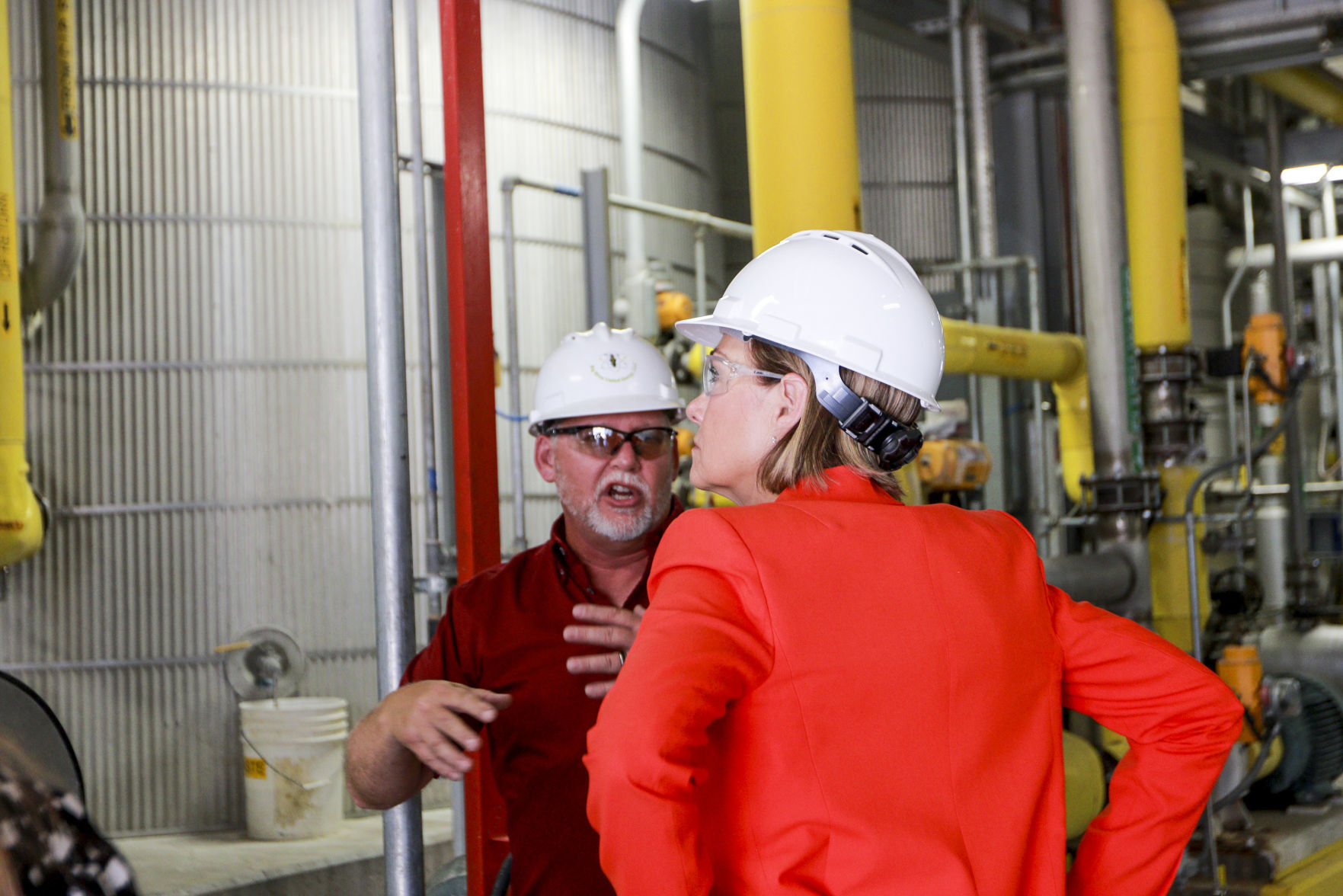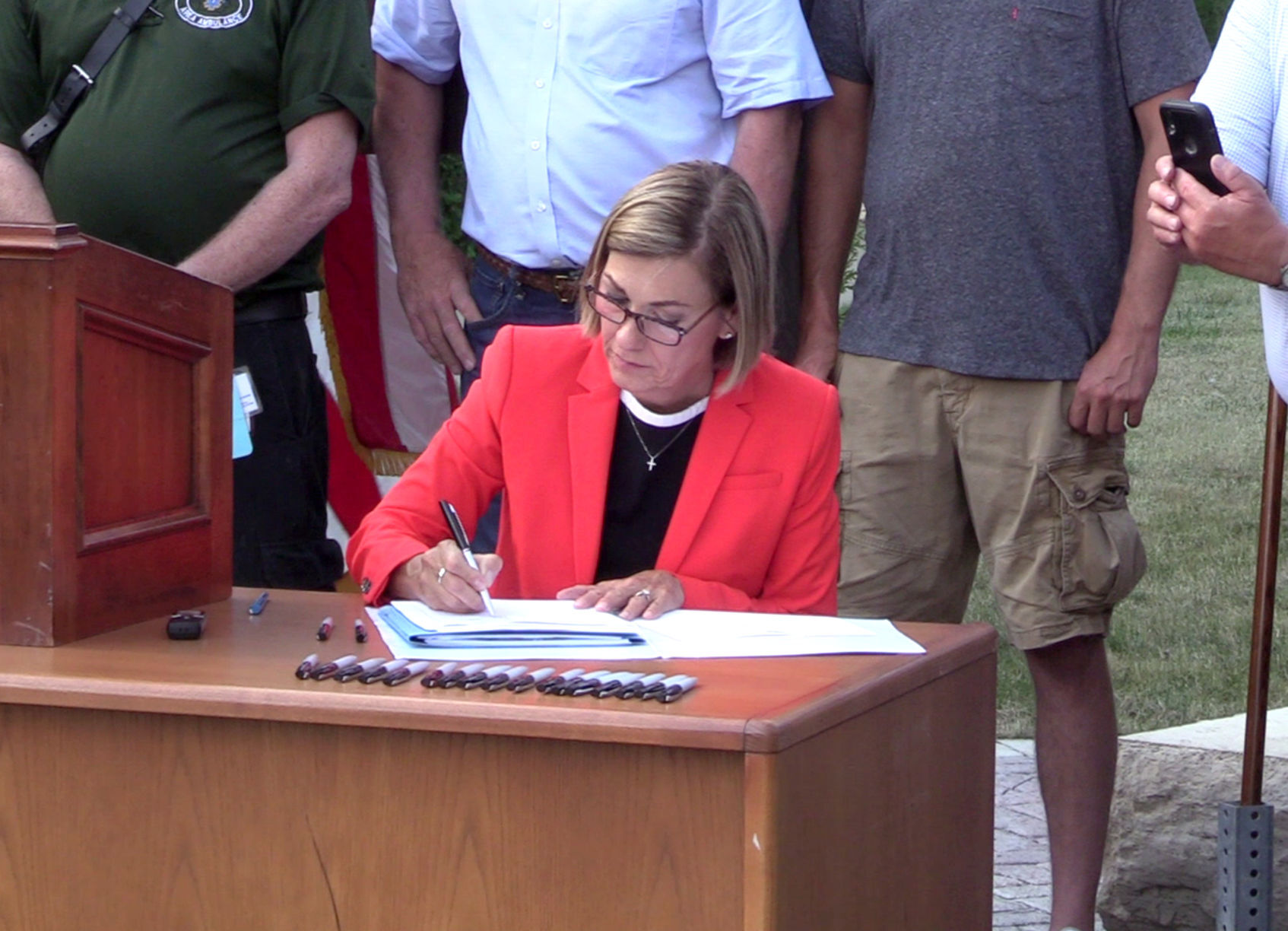MONTICELLO, Iowa — Iowa Gov. Kim Reynolds discussed the impact of the recently wrapped 2021 state legislative session on rural emergency services and biofuels during stops in Monticello and Dyersville on Wednesday.
Reynolds’ day included a tour of Monticello Ambulance Services, where she signed a bill that allows county governments to levy property taxes to fund emergency medical services and training for positions in those services with voter approval.
“COVID-19 made it clearer than ever how important our first responders are,” Reynolds said, applauding the state lawmakers and community partners who worked on the bill in various forms over nine years.
The bill was one of the top priorities for Iowa Rep. Lee Hein, R-Monticello, heading into this year’s session. He has supported increased funding for rural EMS for years.
“At one time, we had it coming from fines for reckless driving,” he said. “That wasn’t going to fly. This allows the local people to decide if they want to fund rural EMS. That protects the taxpayer but provides support for these vital services.”
The bill offers several avenues for local governments to raise taxes to fund their services.
In one, a city and the surrounding rural area it serves could form a district. The district could raise property taxes if 60% of voters in it approve the measure.
In another, a countywide levy can be instituted if the board of supervisors passes a resolution, then forms an advisory board to determine how much money needs to be raised. The levy would then require voter approval.
Paramedic Sandy Heick had worked with lawmakers on the bill for years and was at Wednesday’s signing. She said she hopes the ongoing pandemic may give services the support they would need from voters under the bill.
“COVID had a lot to do with bringing EMS to the forefront,” she said. “We’re hoping we can go out and show them and convince them that we need this so when they call 911 someone is always there. We’re not going to ask for anything more than we need.”
Monticello Mayor Brian Wolken, though, said he was glad the bill passed but should local officials seek to raise funds, the measures would take some serious marketing.
“We’ve had a lot of blunt, hard conversations about EMS funding,” he said. “You never want to say you might cut services, but we have had to be really creative. This is a first step anyway. We’ll still have to convince them.”
Not every priority of Reynolds and Hein passed this year.
A big priority for both was an effort to bolster the state’s renewable fuel standard and measures related to ethanol in gasoline. Hein worked on it between chambers with Iowa Sen. Dan Zumbach, R-Ryan, for the entire session.
Hein said Wednesday that the effort simply ran out of time.
“We listened to the ethanol people. We listened to the retail folks,” he said. “We had narrowed it down to (requiring gas stations to offer E15 gasoline) as a choice, but we just weren’t there. We’ll give it another push next year.”
Both Hein and Reynolds visited Big River United Energy in Dyersville on Wednesday.
Big River is a major industry player in eastern Iowa, grinding an average of 128,000 bushels of corn per day for ethanol and other biofuel products, mostly direct from farmers’ fields. Company officials had been watching the progress of the bill closely.
After a tour of the facility, Reynolds said taking a step back from the process rather than forcing through an imperfect package was the better move.
“It got to the point where we thought if we did just something, (the Legislature) would be less likely to come back to it next year,” she said. “We want it to be effective and to move the needle. If we just check a box, we may never get there. This will benefit all of us. We just need to work together a little more.”
Big River CEO Jim Leiting said he is still optimistic that a deal could be reached in 2022.
“Maybe we focus on access more than restrictions to avoid some of the problems and make it more palatable,” he said.
Iowa Democratic Party Chairman and state Rep. Ross Wilburn said in a statement that there was not much for Reynolds to celebrate about the 2021 session.
“The 2021 Statehouse session was full of backroom deals, with special interests pulling the strings,” he said. “We had a real opportunity to help Iowa families and small businesses recover from the pandemic, but instead Iowa Republicans chose to pursue the most divisive and partisan agenda possible.”



